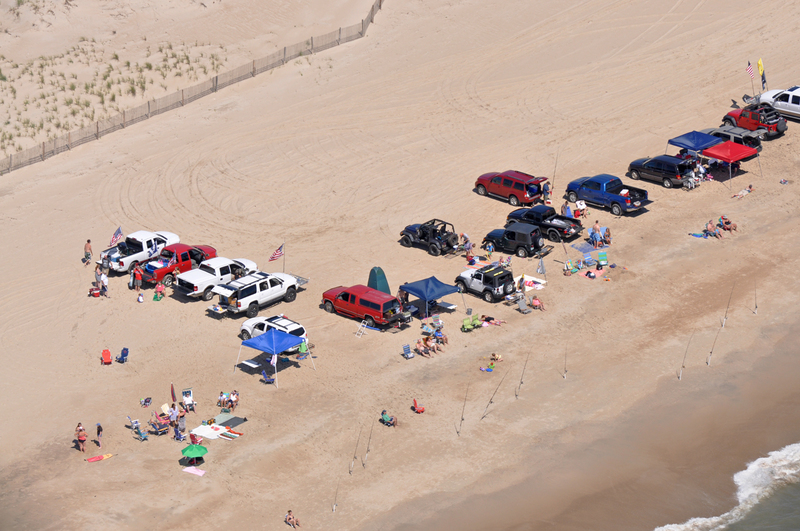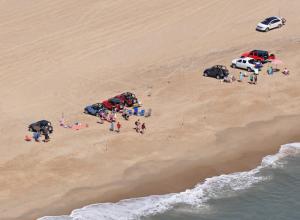The sale of permits allowing surf fishermen to drive on certain state beaches has risen 30 percent over the last four years, state officials say. At 14,809 and counting in 2014, some 1,300 more permits have been issued this year, compared with the total for all of last year.
Cape Henlopen State Park in Lewes is the most popular destination for people who want to drive on the beach, said Ray Bivens, director of Division of Parks and Recreation. On weekends and holidays, because the area for parking is limited, the beaches are so full, people park four or five cars deep.
While permits for driving on the beach are issued to surf fishermen, many fishermen say on weekends the beaches are full of people who have no intention of fishing. They claim folks exploit a loophole by tossing a line into the ocean to create the illusion they are actively fishing.
“It's gotten bigger over the years because everyone and their grandmother has a four-wheel drive car,” said Rich King of Delaware-Surf-Fishing.com. “I go down there because I want to fish, but I don't do it on the weekends.”
Weekdays are not a problem, he said, as most surf fisherman will find plenty of space at any of the drive-on beaches. Issues only arise on holidays and weekends, he said. Over the Fourth of July weekend, the drive-on beaches were full by 10 a.m.
|
2012 – 12,988 2013 – 13,462 2014 – 14,809 |
||||
Permits cost $65 annually for Delaware residents and $130 for nonresidents. Discounts are offered to seniors. There is no limit to the number of permits the state issues. From 2011 to 2014, the number of permits issued has risen by 3,387, said Joanna Wilson, spokeswoman with the Department of Natural Resources and Environmental Control.
Bivens said the number of permits sold is just one data point to determine if beach activity is on the rise. It is not necessarily the most accurate, he said.
“Somebody could use it five times or 50, so it's not the most reliable,” he said.
Although, he said, state officials have noticed an uptick in beach driving in recent years. He said his rangers often do beach counts, surf vehicle inspections and analyze aerial photographs to determine how many people are using the surf-fishing beaches. The latest flyover on Fourth of July weekend showed wall-to-wall vehicles, he said.
No fishing required?
The drive-on beaches recently became a hot topic when Sen. Dave McBride, D-Wilmington, introduced a bill in late June to relax requirements for those who drive onto the state's beaches. The legislation, which did not pass before the end of legislative session June 30, would allow permit holders to use the beach recreationally from Memorial Day to Labor Day without putting a line in the water.
In a follow-up email to constituents, McBride said he never intended for the bill to go to a vote; he said he wanted to begin a conversation.
“That request raised some important issues about finding the balance among the competing desires for use of our beaches,” he said. “This deserves a full discussion among all the interested parties to see if we can find common ground that can accommodate the desires and competing interests of all concerned.”
Sen. Ernie Lopez, R-Lewes, said the bill has his constituents talking; if it resurfaces, he expects to hear a lot more from the people of his district.
“The input from constituents will be the determining factor in moving this bill forward,” he said. “We want to make sure something like this gets as much vetting as possible, and constituents get as much say as possible.”
Other legislation related to surf fishing permits, House Bill 236, was also considered during the latest legislative session, but was later tabled by its sponsor.
Introduced by Rep. Earl Jaques Jr., D-Glasgow, the bill was based on earlier legislation that gives free surf-fishing tags to all Delaware volunteer firefighters, EMTs and fire department life members. Jacques wanted to add members of the Delaware National Guard to the list of those who don't have to pay for permits.
Bivens said he voiced concern for HB236 when it was introduced in January.
“We already have a carrying-capacity issue,” he said. “More free tags is not going to help the issue.”
But why are people attracted to the drive-on beaches? For one, it could be relaxed beach rules. Alcohol is permitted in certain areas in the state, including the surf-fishing beaches. It is prohibited year round in designated swimming areas, surfboarding areas and pools, the rules and regulations say.
Pets are also allowed on surf-fishing beaches, so long as they are leashed. While permitted in the off season, pets are banned from swimming and sunbathing beaches from May 1 to Sept. 30.
John Doerfler, vice chair of the Delaware Chapter of the Surfrider Foundation, said he believes many people think $65 is worth the price to drive on the beach even while visiting for a week and that it provides a sense of nostalgia.
Jim Hall, chief of Cultural Resources with the Division of Parks and Recreation, said beach driving goes back as far as the earliest automobiles. The Department of Transportation has photos of Model A's and Model T's on the beach, he said.
He said it is unclear when the state regulated where and when folks could drive on the beaches. He suspects it is whenever the state created recreational swimming beaches, sometime after the Division of Parks and Recreation was created in 1954. Prior to then, the beaches were under the purview of DelDOT, he said.
In doing research, Hall said, he found minutes from a meeting discussing surf-fishing beaches from between 1968 and 1970. He said the public comments are very familiar.
"It's like reading the newspaper now," he said. "It's the exact same arguments by many of the same parties – birding people, nature people, fishermen. It's the same tune being played all over again."
Safety and enforcement
McBride's legislation, which drops the fishing line requirement during the summer season, is couched as a public-safety measure, saying it is dangerous for families to be swimming in the ocean with a fishing line from every vehicle. Some fishermen argue children shouldn't be there to begin with.
King said he can see both sides of the argument. If the state allows people to drive on the beach without fishing, he said, the state would need more guarded beaches for swimmers. However, less faux fishing lines could benefit fishermen, he said.
“Without the people out there fake fishing, they won't have to put a rod in the water and get in my way,” he said.
Doerfler said the surfriders are concerned about faux lines in the water. He said people tossing hooks into the ocean who have no intention of catching fish is a safety issue for swimmers and surfers, particularly near the Naval Jetty at Herring Point, a popular surf spot in Cape Henlopen State Park. He said the surfriders have asked the state park to push back the boundary for surf-fishing vehicles to provide more space for swimmers and surfers, but he agrees the state park has a predicament.
“I know the fishermen aren't happy about it," he said. "The fact is there are people paying to do it, and they are not fishing, but they are also paying yearly fees and keeping the parks well maintained."
King said it comes down to enforcement of the rules.
“The rangers have a tough job,” he said. “People always say enforcement is not doing their job, but they don't have enough guys. If they wanted to go out and enforce on a Saturday, it would take all day to deal with one beach.”
State parks Chief of Enforcement Wayne Kline said the most common offense in his parks is nonpermitted vehicles on the beach, whether a car with no tags or someone trying to use another vehicle's permit. The second-most common offense, he said, is fake fishing.
It is very difficult to determine who is fishing and who is not when vehicles are stacked four or five deep, he said, but some offenders can be discovered through random inspections as vehicles enter the beach.
Permit holders are required to possess a fishing pole, bait and tackle. For safety, they also must have a low-pressure tire gauge, a tow rope or chain, a board, a jack and a shovel.
Bivens said the question is not if changes are coming; it's when. DNREC officials met with the Delaware Mobile Surf Fishermen and legislators earlier this year to talk about possible paths forward.
“This was the first-ever meeting we talked to them about making some kind of changes,” he said.
Bivens said there is not one single solution the state is supporting. But limiting vehicles on the beach could come down to capping permits, offering a different level of permit to allow access only on weekends or a reservation system. A gate allowing vehicles on as others leave is also an option, but likely to only work at Cape Henlopen, he said. Assateague Island National Wildlife Refuge uses a gate system to limit the number of vehicles on the beach at any one time to 145.
For those who are determined to get on one of the state park beaches, Bivens suggests people visit one of the state's other beaches near the Indian River Inlet or Fenwick Island. Meanwhile, he said, the state will continue to work on the issue.
Said King, “They have a large mess to deal with, and I don't know how they're going to do it.”
Nick Roth is the news editor. He has been with the Cape Gazette since 2012, previously covering town beats in Milton and Lewes. In addition to serving on the editorial board and handling page layout, Nick is responsible for the weekly Delaware History in Photographs feature and enjoys writing stories about the Cape Region’s history. Prior to the Cape Gazette, Nick worked for the Delmarva Media Group, including the Delaware Wave, Delaware Coast Press and Salisbury Daily Times. He also contributed to The News Journal. Originally from Boyertown, Pa., Nick attended Shippensburg University in central Pennsylvania, graduating in 2007 with a bachelor’s degree in journalism. He’s won several MDDC awards during his career for both writing and photography. In his free time, he enjoys golfing, going to the beach with his family and cheering for Philadelphia sports teams.


























































